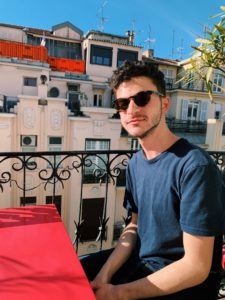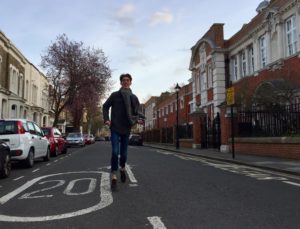Does Toxic Masculinity Exist in London?
Recently, I spoke with several male friends studying in London, either full-time or with IFSA, to discuss if toxic masculinity exists in London, and how it differs from where they’re from. I was surprised to find so much overlap in their responses!

Alex, who attends Pomona College in California but is studying at University College London with IFSA for the semester, thought that here in London, “The way they define masculinity is less about being dirty, macho, or having no feelings.” Similarly, Pryor, who attends Wesleyan University in Connecticut but is studying abroad at Queen Mary, University of London, has noticed a greater willingness among men to express emotion. Especially in his hometown of Atlanta, Georgia, he felt that masculinity is often marked by the need to brush off emotions, stating “They put up more of a wall back home.” He contrasted this with this experience in London, where masculinity “seems less defined and there’s less pressure to conform to those standards,” even noting that he has seen more guys crying openly here.
Owen, a full-time Queen Mary student from a small town an hour south of the city, has had comparable experiences. Speaking of his experiences before entering university, he remembered, “Particularly with the people I hung around with, it seemed to be quite a lot of focus on being masculine” and “If you had some feminine traits then people would call you gay.” He admitted to feeling pressure to conform to standards of masculinity at times. When asked if he has felt those same pressures in uni, he

said, “No, definitely not. Here, I think everyone is a lot more accepting. I don’t feel any pressure at all.” While he only felt comfortable opening up to girls when he was younger, in university he feels he can turn to male friends if he needs to. Echoing Alex and Pryor’s reflections, he attributed the difference in attitudes toward masculinity in part to being in a large, diverse city.
Alex and Pryor both discussed self-expression through clothing. Alex offered anecdotal evidence of disparities between North American and European attitudes on the topic, recalling, “I was in Canada this past summer and my housemates thought I was gay purely based on my jeans…that my jeans were cuffed and I wore skinny jeans,” versus, “my flatmates here were like, ‘you dress quite well for an American.” In addition to noticing less

stigma around presenting yourself in a clean, put-together way here, he noted that male students often wear fun, colorful things that you wouldn’t often see American guys wearing out. I have made the same observation! Similarly, Pryor, in regards to his slightly more ‘feminine’ self-presentation, said: “I feel like I’m getting fewer up and down glances…people are less phased.” Overall, the guys I spoke with have experienced much less pressure to comply with Western standards of masculinity here in London.
Nonetheless, toxic masculinity does prevail here, as agreed upon by each of the guys. I experience the effects of this epidemic nearly every time I go to a club with friends and am harassed by men (of all nationalities) who feel they have a right to my body. While nightlife culture has a long way to go in combating toxic masculinity, I have noticed the same general attitudes surrounding masculinity here as the friends I spoke with. I regularly see dads out alone walking with their babies strapped to their chests or cozied up in strollers. I sense a warmer, more accepting attitude on campus towards the queer community. And the male friends I have made here generally seem to care less about being ‘masculine’ and more about being good people. So, here’s to kind men. May we know them, may we be them, may we raise them.
Sierra DeAngelo studies Environmental Biology at Colgate University and studied abroad with IFSA at Queen Mary, University of London in England in spring 2019. She served as an International Correspondent for IFSA through the Work-To-Study Program.
